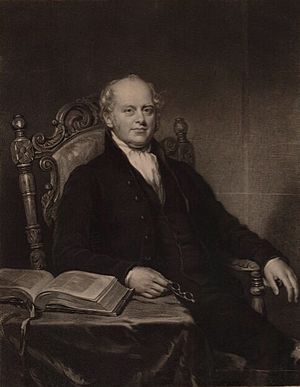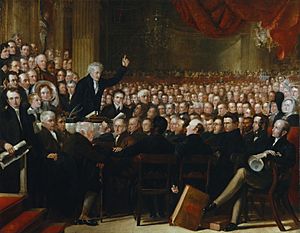Isaac Crewdson facts for kids
Quick facts for kids
Isaac Crewdson
|
|
|---|---|
 |
|
| Born | 6 June 1780 Kendal, Westmorland
|
| Died | 8 May 1844 Bowness-on-Windermere, Cumberland, UK
|
| Resting place | Rusholme Road Cemetery, Manchester, UK |
| Nationality | English |
| Occupation | Mill Owner, Minister of the Religious Society of Friends |
| Known for | Founder of the Beaconites |
| Spouse(s) | Elizabeth Jowitt (married 27 July 1803) |
Isaac Crewdson (born June 6, 1780 – died May 8, 1844) was an important minister for the Quakers in Manchester, England. He wrote a book called A Beacon to the Society of Friends in 1835. This book caused a big split among the English Quakers.
Contents
Isaac Crewdson's Early Life
Isaac Crewdson was born into a Quaker family in Kendal, a town in England's beautiful Lake District. He started working in the cotton business and became a very successful mill owner in Manchester. In 1816, he became a Quaker minister.
The Evangelical Friends (Beaconites)
Isaac Crewdson and his brother-in-law, William Boulton, started a new group called the "Evangelical Friends." Other Quakers often called them "Beaconites."
They began holding their Sunday worship meetings on September 18, 1836, in a small school in Manchester. Later, on December 17, 1837, they opened their own chapel in Chorlton-on-Medlock. This chapel could hold 600 people.
New Religious Practices
The Evangelical Friends added some practices to their worship that traditional Quakers did not use. These included baptism and taking the Lord's Supper. Quakers usually avoided these practices because they believed they could get in the way of a direct connection with God.
The Evangelical Friends even held their own Yearly Meeting in London in 1837, similar to the main Quaker Yearly Meeting. For a short time, they also published a monthly magazine called The Inquirer.
Fighting Against Slavery
Isaac Crewdson was very active in the movement to end slavery, known as Abolitionism. He attended the World Anti-Slavery Convention in London in June 1840. This was a big meeting where people from all over the world gathered to talk about how to stop slavery.
Isaac Crewdson's Legacy
Isaac Crewdson passed away in Bowness on May 8, 1844. He was buried in Rusholme Road Cemetery in Manchester.
After Crewdson's death, the Evangelical Friends group slowly faded away over the next ten years. Many of its members joined another religious group called the Plymouth Brethren. They brought some of the simple Quaker ways of worship to this new movement.
The Beaconite chapel, which didn't have many people attending, was sold to the Baptists in 1844, the same year Crewdson died.
Some people later felt that Isaac Crewdson's ideas were ahead of his time. By the 1900s, some Quakers had started to think more like Crewdson did in the 1830s.
 | May Edward Chinn |
 | Rebecca Cole |
 | Alexa Canady |
 | Dorothy Lavinia Brown |


